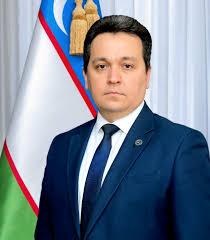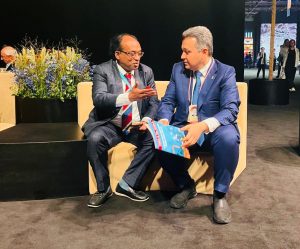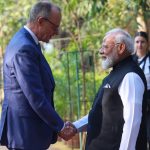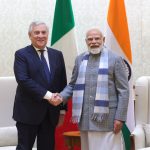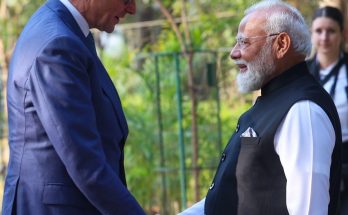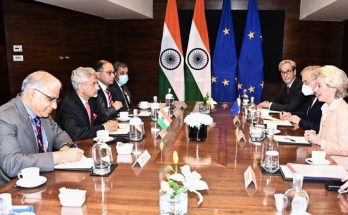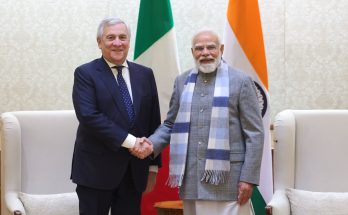TASHKENT: Uzbekistan has emerged as a key player in Central Asia’s digital and creative economy, a transformation that has been gaining international recognition. Hosting the fourth edition of the World Conference on Creative Economy (WCCE) in Tashkent, Uzbekistan is positioning itself as a hub for innovation, digital technologies, and creative industries. This global event, attended by policymakers, industry leaders, and creative entrepreneurs, serves as a platform for Uzbekistan to showcase its rapid advances in technology, education, and digital infrastructure.
In this interview with Manish Chand, CEO, Centre for Global India Insights and India Writes Network, Uzbekistan’s Minister of Digital Technologies Sherzod Shermatov in the Uzbek capital Tashkent hared his vision of the Central Asian nation’s vision for accelerating digitalization and multi-faceted ties with India. The minister, an ardent proponent of stronger India-Uzbekistan ties, also speaks about Uzbekistan’s efforts to build a thriving IT ecosystem, the growing collaboration with Indian companies, and the deep-rooted cultural ties between India and Uzbekistan, symbolised by the enduring love of Uzbeks for Indian films.
Q: Uzbekistan is witnessing a far-reaching transformation, especially in the field of IT. What are your plans for accelerating digitalization and the adoption of digital technologies in the country?
A: Our mission is to improve people’s lives through digitalization while creating new opportunities for our youth to find income without having to leave the country. Instead of our people seeking jobs abroad, we aim to bring more job opportunities for people in Uzbekistan. That’s why we are continually creating the best environment for IT companies to set up offices here.
In the past two years, the number of companies with foreign capital has increased 20 times, and Uzbekistan’s IT exports have nearly doubled or tripled each year. Our target is to achieve at least $5 billion in annual IT export revenue by 2030 and to create 300,000 jobs in IT export companies. In terms of education, we have made significant changes at all levels. Preschool coverage has expanded rapidly, and the quality of school education has improved. All schools are now connected to high-speed internet, and we have revised the IT curriculum. We are also continually working on capacity building for our teachers.
Access to higher education has expanded significantly. Previously, only 9% of graduates could pursue higher education, but now, nearly 50% can. This is due in part to the opening of new private and international universities, including many from India. We aim to create a welcoming environment for international IT companies by providing affordable talent and the best conditions for them to thrive in Uzbekistan.
Q: You mentioned the growing connection between India and Uzbekistan. As India is an IT superpower and Uzbekistan is an emerging IT hub, how do you see the collaboration between the two countries in areas such as IT, digital technologies, and AI?
A: Uzbekistan has a strong and growing partnership with India, both with the Indian government and private institutions. We are very much inspired by India’s leadership in IT outsourcing, and we are implementing a regulatory framework that ensures IT companies are treated well in Uzbekistan. Several Indian universities have established a presence here. Amity University has an office in Uzbekistan, and we recently invited Acharya University to open a campus in Bukhara, which is a region known for its strong math education. Historically, people from this area have excelled in international math Olympiads.
We are also actively discussing opportunities with Indian companies to open delivery centres in Uzbekistan. This would help Indian companies reduce their operational costs and expand their services using the talented, affordable workforce we have here. Uzbekistan’s location is ideal for companies looking to expand into both the Russian-speaking market and the Arab region.
We are only one hour behind countries like Saudi Arabia, Qatar, and the UAE, and we have strong cultural and historical ties with them. Many people in Uzbekistan speak both Russian and English, which makes it easier for companies to tap into multiple markets, including the Russian-speaking world, where Russian remains one of the top UN languages.
Q: Uzbekistan has positioned itself as a hub for the creative economy. How do you see digital technologies playing a role in driving the creative economy?
A: Uzbekistan is at a unique juncture, and we need to use our creativity to find jobs for our young people. Digital technologies provide a platform for young people to express their creativity and earn additional income through the internet. For example, one of our companies, United Soft, exports multimedia services to the Indian movie and cartoon industries. Indian films often use the creativity of our young people. There are also young content creators in Uzbekistan who are generating millions of views on YouTube, which is providing them with extra income.
In addition, we have a growing game development sector, with many companies creating game characters and concepts. Korean companies are even opening offices here to tap into our local talent. Digital technologies allow young people in the regions of Uzbekistan to find high-paying jobs without leaving the country, as companies are bringing those opportunities here.
Q: Have you visited India? How do you perceive the cultural connection between India and Uzbekistan, especially considering the popularity of Bollywood?
A: Yes, I have visited India, and the cultural connection between our countries is deep-rooted. Historically, there have been myriad connections between India and Uzbekistan. Babur, the founder of the Mughal Empire in India, is from Uzbekistan, and his ancestors maintained strong links between our nations.
Uzbek people love Indian movies, especially Bollywood. This love has persisted over time, and many people here know Bollywood stars and singers. Recently, one of our local singers released a video that became very popular, gaining millions of views on YouTube. There’s a growing trend among our artists to create content that appeals to Indian audiences, and this is a reflection of the strong cultural affinity between our two countries.
Q: How does Uzbekistan view India’s rise as a global power?
A: We have excellent cooperation with the Indian government. I had the honour of greeting Indian Prime Minister Narendra Modi when he visited Uzbekistan for the Shanghai Cooperation Organization (SCO) Summit in Samarkand in 2022. It’s great to see India becoming a major destination for foreign direct investment. India’s development will strengthen mutual trust between our nations and create more win-win opportunities for both our businesses and our people.
(Manish Chand, is CEO, Centre for Global India Insights, a think tank focused on global affairs, and Editor-in-Chief, India Writes Network and India and the World. He visited Uzbekistan for the 4th World Conference on Creative Economy (WCCE) in Tashkent)
Author Profile

- Manish Chand is Founder and Editor-in-Chief of India Writes Network (www.indiawrites.org) and India and World, a pioneering magazine focused on international affairs. He is CEO, Centre for Global India Insights, an India-based think tank focused on global affairs.
Latest entries
 India and the WorldJanuary 13, 2026India, Germany raise the bar for defence, economic ties
India and the WorldJanuary 13, 2026India, Germany raise the bar for defence, economic ties India and the WorldDecember 12, 2025India-Italy bonding: Tajani’s visit raises the bar for business, maritime ties
India and the WorldDecember 12, 2025India-Italy bonding: Tajani’s visit raises the bar for business, maritime ties In ConversationNovember 26, 2025G20 is a Force for global Good
In ConversationNovember 26, 2025G20 is a Force for global Good articlesNovember 26, 2025Rescuing G20 from North-South divide: Ubuntu Moment
articlesNovember 26, 2025Rescuing G20 from North-South divide: Ubuntu Moment

